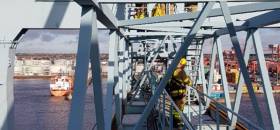Displaying items by tag: Height Training Programme
Scaling New Heights As Dublin Fire Brigade Practice Exercises from Port Container Cranes
#DublinPort - In recent weeks Dublin firefighters scaled 110ft high container gantry cranes in Dublin Port so to play out real life situations as part of an ongoing height training programme.
Firefighters and paramedics from Dublin Fire Brigade were invited to the port by terminal operator Peel Ports, where they were given the chance to practice for worst case scenarios at height.
The cranes are used to load and unload container ships calling at the port and bound for locations in the UK, the Netherlands, France, Iberia and onwards worldwide. Up to 170,000 TEU pass through Peel Ports’ MTL container terminal each year, carrying a variety of goods and materials.
Firefighters recreated a situation whereby a crane driver had suffered a heart attack while in the cab. From the arrival of the height rescue team, they had scaled the crane, treated the driver and safely brought them to ground level within 28 minutes. This scenario also had an advanced paramedic treat the casualty from the top until they were lowered.
In a second drill, a maintenance engineer suffering spinal injuries was stabilised and brought to ground level while being treated by paramedics within 40 minutes.
The visit was also used by Peel Ports to strengthen and test its own health and safety procedures.
John Robinson, an officer and heights rescue instructor at Dublin Fire Brigade, said “It’s a great opportunity to train with the cranes here in the port. This allows us to build our training around a real life scenario that our fire crews could get called to and makes it interesting for them. I’d like to thank Peel Ports for allowing us to train on their facilities and we look forward to building this relationship further in the future.”
Stephen O’Gara, Operations Manager from Peel Ports, said: “We would like to offer our thanks to Dublin Fire Brigade for accepting our invitation to train using our facilities at the port. Working closely with our emergency services and preparing for the worst case scenarios ahead of time is incredibly beneficial for everyone involved and could be crucial when it comes to resolving a potentially life threatening situation. Health and safety is absolutely crucial to everything we do at Peel Ports, with our central aim that each member of staff returns home safely every day. We look forward to welcoming the fire crew back to the port at a future date and continue developing this important relationship”
For more information on Safety365 click HERE






























































